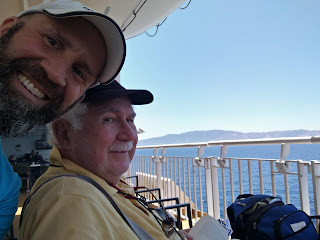About a year ago, I called my dad and told him that I was feeling demoralized about the state of Democracy. It's not difficult when you live at "ground zero for the twilight zone," aka- Washington, DC.
With a long legacy of 1:1 father-son trips, I suggested that he and I go to the birthplace of democracy, Greece, to find some inspiration.
So, that's what we did.
We read Plato's Republic in preparation (he did much more than that) to get ourselves in a "Greece of the mind."
More than seeing sites or even discussing democracy, I was just trying to relax the brain for a while and appreciate the fact that I was able to travel to Europe with my 84-year old father.
I noticed that, in almost every place we went, he was the oldest person by 15-20 years, a true testament that age is a state of mind, not a number. He continues to demonstrate an insatiable thirst for knowledge and we used our time together to discuss a range of topics including democracy, authoritarianism, governance, crypto technologies, artificial intelligence, society and culture, history, Judaism, modes of transportation, and more.
Athens looks like a city that peaked a few centuries ago. It's grimy. Most Greeks seem to be depressed about the economy. There's a lot of animosity and anger towards the Germans (after all, they were the ones demanding 'austerity'). Over 500,000 young Greeks have left the county in the last 9 years. The 'brain drain' is real.
Meanwhile, the country is flailing about as it tries to figure out a way to pay for its excessive expenditures against limited revenues. One thing that stuck out at me were signs in English and Chinese offering permanent residency and a path to citizenship for anyone who invested 250k Euros into real estate.
Essentially, the Greeks are offering to sell the land out from under their feet. Should be fascinating to watch that.
So, modern-day Greece is depressing. Ancient Greece's contribution to the world, however, should not be underestimated. Leaving aside our modern sensibilities in terms of who gets to participate in the democratic process, their innovation was revolutionary.
They had term limits. There was a lottery for public roles. Everyone was expected to participate.
Plato, interestingly enough, didn't like the idea as he was afraid of "the mob"...which we basically have today on Twitter. He thought that a groomed elite was the way to go.
After 2 days in Athens, which included a visit to the Chabad house and a Greek sephardi synagogue, we took off to the tourist destination of Santorini. Most of the year, it has a population of 15,000. In the summer, there are over 100k people on the island. 4 cruise ships stop there every day. Yet, despite all of that, the peace and tranquility of the island, which is actually a 'caldera'-formed when a volcano collapses in upon itself and the water rushes in- is remarkable.
Waking up to that vista every morning was just what the doctor ordered.
We took some side excursions, most notably to Akrotiri- the archaeological site of a prehistoric Minoan civilization that demonstrated remarkable technical advancement for its time.
Overall, a great trip and I am very grateful that I had the chance to go. Some pics are below.
Santorini has some tremendous sunsets.
Some of the cruise ships in the caldera.
The town of Fira.
Another sunset.
Father and son on the ferry from Athens to Santori.
The water of the Aegean is so blue.
The "Greek Freak" is a big deal.
The Parthenon. An impressive architectural site.
The Parthenon is a building. The Acropolis is the hill upon which it (and the other temples surrounding it) are situated.
The temple to Poseidon.
We scored a rooftop view from our hotel of the Parthenon.
Not bad.
Athens may be grimy, but it also has some wonderful sunsets as it is situated in a "bowl' surrounded by mountains. The area is known as "Attica."












